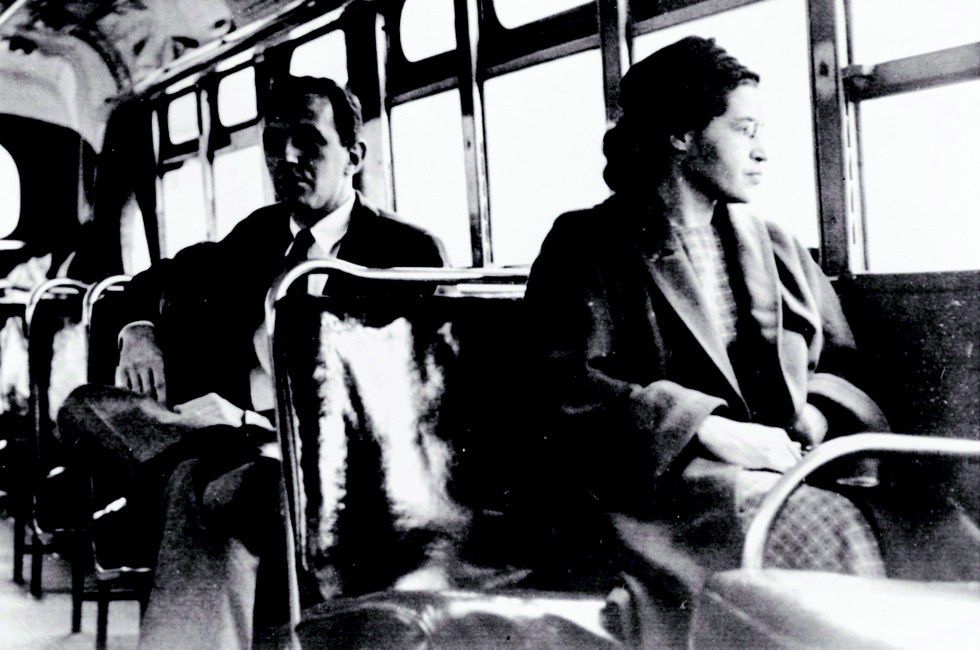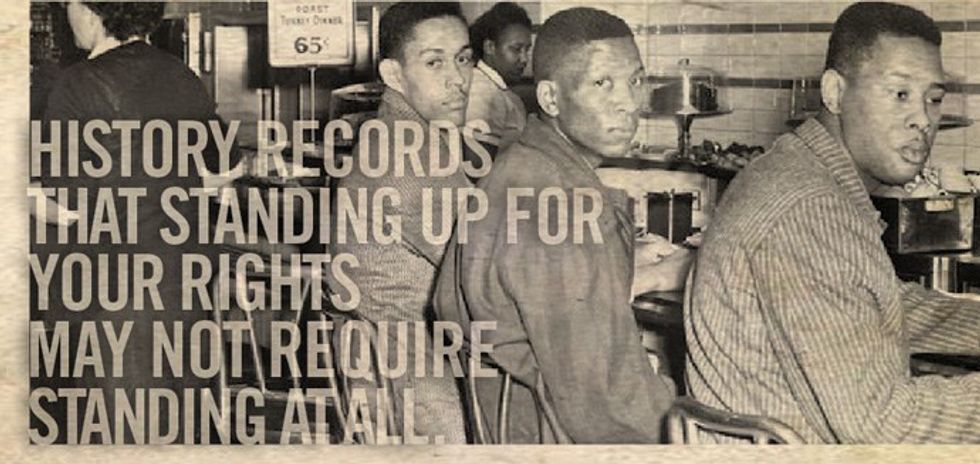Colin Kaepernick has recently made headlines for his refusal to stand during the national anthem, inciting a conversation about race in America and first amendment rights.
Kaepernick is not the first black person to incite white outrage through aggressive sitting. Rosa Parks sparked the Montgomery Bus Boycott and arguably the civil rights movement in 1955 by refusing to give up her seat to a white passenger. Though she was not the first to be arrested for such an act, she had the most appealing case; she was an upstanding citizen well liked in the community. Remember that, it’s important for later.
Now we have the civil rights movement. We’ve got protests. We’ve got rallies. We’ve got marching demonstrations. Martin Luther King Jr. even had a dream. In addition, we had something called a sit in. The sit in served as a complement to the other forms of protest. The beauty was that when marches and vigils could be construed by the media as uprisings or even violent, the sit in provided a quiet alternative in which a participant literally did nothing but sit and usually still got arrested or beaten for it. At most, the crowd of people was an inconvenience, but the act itself was incredibly passive and was effective at communication.
Fast forward 60 years to an NFL football game when a football player who anyone that doesn’t follow sports didn’t realize existed decided to sit as the national anthem played, and everyone freaked out. He sat on the grounds that, in essence, he could not support a country which did not support the lives of black people. Several arguments have come forth both for and against Kaepernick’s actions, but many are disingenuous to the issue.
The first is that his refusal to stand is a refusal to respect our troops. He offered this statement on the matter: “They fight for freedom, they fight for the people. They fight for liberty and justice. For everyone. And that's not happening.” As far as respecting the flag itself, many were quick to respond either way to the argument via Twitter, I think this quote most eloquently explains the issue.
Amendment I
Congress shall make no law respecting an establishment of religion, or prohibiting the free exercise thereof; or abridging the freedom of speech, or of the press; or the right of the people peaceably to assemble, and to petition the government for a redress of grievances.
– The Bill of Rights
So yes, while you may believe that Colin Kaepernick disrespected the flag, he is well within his rights to do so, as this could fall under freedom of speech, assembly, or redress of grievances. On a more ironic note, many dissenters probably have violated the flag code.
The second is that his position on black inequality is deceitful because he was raised by a white family, gained wealthy from the NFL, and is largely separated from the struggle he claims black people suffer through. Yes, he does not have the same struggle as many black Americans, but that does not mean that they do not struggle. If Angelina Jolie were to speak out about child hunger, no one would say that was hypocritical because she is not hungry.
For many black people raised in a predominantly white community, getting older is realizing the disparity among the lives of black people, and using their own privilege to make it better. The people who have been victimized by systematic racism have been complaining for the past 60 years, and we just started listening. This is in part due to technology and increased communication. People like Colin Kaepernick are able to legitimize the issue. Remember earlier when I said that Rosa Parks was used as the icon because she was an upstanding member of the community? Instead of hood rats on the neighborhood news, we are presented with someone who grew up outside of these communities and is able to observe what’s going on and address the issues of our present day society. Sitting doesn’t make him a hero, but if silence is violence, then he is not the villain.
This brings me into my third and final point. Aside from the people who quiet any arguments of “racism doesn’t exist” by addressing Mr. Kaepernick as Ni**** and other slurs, many have thought of other reasons to decry the act. There are certain issues that humanity is generally on board with solving but somehow don’t disappear. Weird. Think child hunger, sex trafficking, protecting endangered animals, etc. Racism is not one of these issues. Whereas in most cases you have those perpetuating the act (i.e. drug lords), those suffering, those who are trying to enact change, and the passives, with racism the groups overlap. Predominantly, those who try to enact change are generally the ones suffering or who could potentially suffer, Philando Castile vs. Colin Kaepernick, though there are exceptions (#HowToBeAnAlly), but with racism, being passive is being complicit. While the world does not exist in cut out stereotypes, many who are passive feel demonized when addressed as an aggressor. This is why when there are protests, people analyze ad absurdum who is protesting (are they “good” people, or are they poor black druggies), how they protest (are they inconveniencing someone’s life), and the frequency of the offensive act (#NotAllCopsKillYoungBoysMostlySoIDontKnowWhyWeAreAllUpset) before talking about how American culture is racist.
Pictured above, Google search queries for police brutality in the US, 2004-present.
It is easier to attack the people surrounding the issue until it’s not. Colin Kaepernick challenged the stereotype many were accustomed to fighting against. He was not directly involved, he individually does not gain from adding to the conversation, he is addressing a larger problem instead of one individual case—police brutality is neither the beginning or the end of racism in America—and he came out of nowhere. He was not a self-proclaimed SJW organizing a vigil, reading slam poetry, or creating a hashtag, he did something fairly unimpressive in his ordinary life. Many white Americans are not accustomed to having to consciously address race in daily life, and the importance of this is that it keeps the issue from dying down whenever there isn’t a bloodied child on television, which in modern media is actually quite a feat.
I highly doubt that Colin Kaepernick is the next Rosa Parks, and I won’t equate their struggles, but I hope at least that he can boost the conversation that brings people to the realization that for some Americans, race isn’t just something to complain about on the internet.
























 sunrise
StableDiffusion
sunrise
StableDiffusion
 bonfire friends
StableDiffusion
bonfire friends
StableDiffusion
 sadness
StableDiffusion
sadness
StableDiffusion

 purple skies
StableDiffusion
purple skies
StableDiffusion

 true love
StableDiffusion
true love
StableDiffusion
 My Cheerleader
StableDiffusion
My Cheerleader
StableDiffusion
 womans transformation to happiness and love
StableDiffusion
womans transformation to happiness and love
StableDiffusion
 future life together of adventures
StableDiffusion
future life together of adventures
StableDiffusion





















